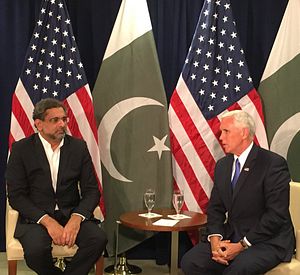About six months ago, U.S. President Donald Trump announced his new Afghanistan policy. While Trump’s policy called for an aggressive military campaign against the Afghan Taliban, it also considered Pakistan’s alleged support for a number of insurgent groups in Afghanistan a major issue that continues to undermine Washington’s counterterrorism efforts in the country.
For the past six months, Washington has continuously put pressure on Islamabad in a bid to force the country into changing its regional security policy. If a number of actions taken by Washington against Islamabad during the last few weeks are any indication, then it’s clear that Trump is willing to go to any lengths to extract cooperation from Pakistan.
A few days ago, the United States imposed sanctions on a number of Pakistani companies for allegedly engaging in nuclear trade. Moreover, reports are coming out claiming that the Trump administration is exploring a range of new options, including “revoking the country’s major non-NATO ally status, permanently cutting off military aid and imposing a visa bars [sic] on Pakistani government officials,” to pressure Pakistan into acting against various militant groups.
Last week, Pakistan’s Prime Minister Shahid Khaqan Abbasi and U.S. Vice President Mike Pence met to discuss Afghanistan’s overall security situation and exchanged views on bilateral relations. The meeting, as expected, was nothing more than a photo-op as there was not any concrete discussion on the issue of the underlying trust deficit between the two countries. There was not any joint statement either, which could indicate that both countries were making efforts to improve their bilateral relations.
On the other hand, both leaders issued separate statements, reinforcing their respective positions on regional security issues. Pakistan’s government in a statement said that “the country has wiped out all militant sanctuaries from its tribal areas.” While referring to Pence’s meeting with the prime minister, the White House in a statement said that “the government of Pakistan must do more to address the continued presence of the Taliban, Haqqani Network, and other terrorist groups operating in their country.”
Clearly, Washington and Islamabad are following two different security policies when it comes to Afghanistan. While the Trump administration recognizes that Pakistan has done a lot of work to root out militant sanctuaries from the country, the former still questions the latter’s sincerity and commitment when it comes to Islamabad’s action against groups that directly target Washington’s interests in Afghanistan and beyond.
Despite the increasing pressure from Washington, Islamabad maintains that there are no militant sanctuaries in Pakistan. On Pakistan’s part, this position is unlikely to change unless both countries take up the question of all their strategic issues behind closed doors. Islamabad would most certainly want to have a good working relationship with Washington. However, advertising Pakistan’s actions only as rhetoric reinforces the country’s strategic insecurities, which continue to remain the main reason for Pakistan’s questionable security policy.
The United States cannot expect a wholesale change in Pakistan’s security policy unless the latter’s strategic concerns are taken into account. Before putting a squeeze on Pakistan for what goes wrong in Afghanistan, the United States needs to devise a policy that takes a broader view of Afghanistan’s internal security and political realities, which continue to defy its counterterrorism efforts.
Trump’s approach of publicly humiliating Pakistan and linking any military assistance to Islamabad’s action against militant groups that target U.S. interests in the region is not likely to bring any significant change in Pakistan’s policy. It’s unclear whether Pakistan has any credible leverage over the Afghan Taliban.
While Pakistan may be interested in keeping the Afghan Taliban a strategic stakeholder in any future power-sharing mechanism in Afghanistan, it’s unlikely that Islamabad favors the ongoing wave of militancy in the country, which certainly adds international pressure on Pakistan as well. Clearly, Pakistan’s policy toward Afghanistan has changed to an extent that the former is ready to genuinely offer its support for any peace process that considers Afghan Taliban as key stakeholders.
For its part, the United States needs to revisit its Afghanistan policy. One can argue that Washington has never given the dialogue process a real chance in Afghanistan. The current U.S. policy toward Afghanistan reflects nothing more than confusion and chaos. It’s unclear how Washington expects to bring peace in Afghanistan though force when the same policy has failed to produce any quantifiable results over the course of the last decade. Currently, the Taliban in Afghanistan control more territory than the elected government. The Islamic State continues to grow its presence in the country and has clearly taken advantage of Kabul and Washington’s inability to formulate a practical security policy to restore genuine peace in the country.
However complicated matters may seem, peace in Afghanistan can only be established through dialogue and by engaging regional states rather than through militarized and open-ended policies with no clear goals.

































